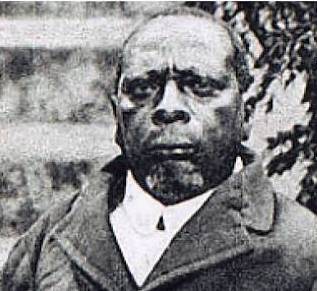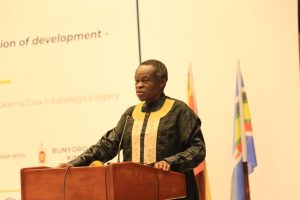Omukama Kabalega: The king history tried to forget – and failed
What you need to know:
Biography
Born around June 1853, Chwa II Kabalega was the Omukama of Bunyoro from 1869 to 1899. He was the last great king of one of the greatest kingdoms in the Great Lakes region.
He resisted imperialism from 1872 when he defeated Sir Samuel Baker’s troops, to January 1, 1894 when the British declared war against him and up to April 9, 1899 when he was shot, wounded in the arm and captured alongside Kabaka Mwanga by Semei Kakungulu and Andereya Luwandagga, two Baganda military generals who were collaborating with the British.
He was forced into exile in Kismayu and later the Seychelles Islands in the Indian Ocean. He died in Jinja on April 6, 1923 on his way back to Bunyoro from exile.
[Source: Monitor]
If truth is the first casualty of war, then the real story of Omukama Kabalega is one of the first and most enduring casualties of the wars that brought colonialism to Uganda.
The imperial war was, of course, won by the colonialists and it is their account of the war that has, for over 100 years, shaped the narrative, including cementing the reputation that Kabalega was a tyrannical leader who destroyed his kingdom in his attempt to resist the “progress” of colonialism.
Kabalega’s reputation had already been spoiled by Sir Samuel Baker, who wrote scathingly of the monarch after his attempt to colonise Bunyoro Kingdom for the Egyptians ended in a humiliating defeat.
While Baker’s account was exaggerated, Kabalega was no angel and had shown a proclivity to violence right from the start. He had come to power in 1869 after the death of his father, Omukama Kamurasi after beating off the stiff competition of his elder brother, Kabigumire. He enjoyed the support of the military and the peasants while the chiefs and the royals preferred his brother.
The succession battle between the two brothers had raged for more than a year and had drawn the intervention of foreign forces, including Kabaka Mutesa I of Buganda who supported Kabalega. The new king cemented his power through bloodletting, including ordering the killing of rival princes and two of his sisters who had not supported his bid.
This ruthlessness continued well into Kabalega’s reign and his soldiers left bitterness and rancour in their wake due to the exacting punishments they meted out on ordinary Banyoro for misdeeds, real and perceived.
This narrative, while important for character assessment, does not do justice to the monarch and his reign during turbulent times. By the time Kabalega came to power, his kingdom faced three existential threats; the breakaway of rebel princes and kingdoms as had happened with Toro, an aggressive Buganda kingdom, and the imperial ambitions of the Egyptian-held Equatorial province in present-day South Sudan.
First, Kabalega created his own power base by appointing loyalists, including ‘no-bodies’ to chieftaincies and other key positions, and encouraging commerce, particularly trade in ivory.
Then he reorganised his military by converting the royal guard, the Abarusura from a police force into a standing army under his direct control. He opened it up to fighters from Lango, Acholi, Teso and renegade Sudanese mercenaries and had, in less than two decades, built the most formidable fighting force at the time.
With it, Kabalega warded off the rebel Toro princes and achieved military parity with Buganda which had more men and more guns, scoring a remarkable victory in 1886 that allowed him the luxury of trying to install a client regime in Mengo.
Yet it was in his resistance to imperial rule that Kabalega earned his place in the annals of greatness, including the grudging respect of his British military foes. Kabalega’s encounter with Baker sealed his fate; it made him both suspicious of foreign interests in his kingdom while giving him belief in his military abilities against the imperialists.
Determination
Critics argue that his war of resistance laid waste to Bunyoro and led, eventually to the destruction of his kingdom at his capture in 1899 and in the years that followed under colonialism.
But Kabalega was consistent in his attempt to defend his kingdom from imperial avarice, even if it meant dying while at it. Throughout the advent of colonialism, many kings had chosen to live as rats rather than die as lions. Not so for Kabalega, who gave the British a good account with far fewer men and resources until he was betrayed and captured.
That war – and the strong-arm tactics of his reign had long divided opinion on Kabalega among his subjects.
“Interviewees’ opinion of Kabalega typically varied according to whether questions were being asked about domestic or foreign issues,” Shane Doyle, author of an authoritative historical account of Bunyoro kingdom before and after Kabalega noted.
“Informants sometimes complained about barusura looting and murder and royal expropriation but then went on to admire Kabalega’s success in achieving unity, defending Bunyoro’s borders and winning victories.”
Although unshaken in his desire to uphold the independence of his kingdom at all costs, Kabalega was pragmatic at the personal level; he believed strongly in witchcraft but also accepted to be inoculated against smallpox. He was withering in his opinion of Kabaka Mwanga whom he accused of bringing them both trouble by failing to stand up to the imperialists, but united forces with him to make a last ditch stand against the British.
Defiance
As a person, his hatred for the “white man” never let up, neither did his regal sense of position. While recuperating in a makeshift ward, post-capture, from the amputation of his shot arm, he was aghast when the white doctor turned up but, instead of coming over to the royal bed, attended to the next patient who was in greater need.
Summoning inner strength, Kabalega raised his frame, leant forward and kicked the doctor in the buttocks, admonishing him for treating a ‘mere commoner’ while he, the king, ailed close by.
Kabalega’s war of resistance was the most robust local response to the imposition of colonial rule yet his place has almost been airbrushed out of Ugandan history.
Under Idi Amin’s rule, Murchison Falls and the national game park of the same name were named after Kabalega, but this was later reversed. The names of the victors – British imperial army officers such as Colonel Henry Colville, Major Trevor Ternan – are plastered over streets in the capital, Kampala. Although he recently received a national heroes’ medal, Kabalega – the one man who stood tall and resisted imperialism – has been reduced to a footnote to the country’s history.
editorial@ug.nationmedia.com
“There are no roads named after him in Kampala, no statues, and no national memorials, yet Omukama Kabalega of Bunyoro, who was only recently named a national hero, deserves a special place in Uganda’s history.”




